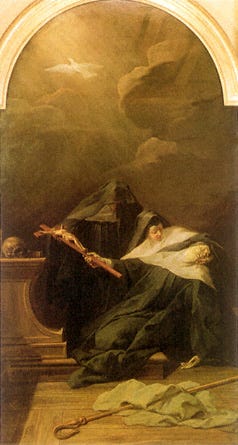(Image: “The Death of St. Scholastica” by Jean Restout, 1730. The following story of Saints Benedict and Scholastica are found in Book II, Chapter 33 of the Dialogues of Pope Gregory the Great.)
Now Benedict had a sister named Scholastica, who had been consecrated to the Almighty Lord from the time of her childhood. She had the custom of visiting him once a year, and the man of God would come down to meet her at a place belonging to the monastery not far beyond the gate.
One day she came, as was her custom, and her venerable brother came down to meet her with his disciples. They spent the whole day in the praise of God and in holy conversation. The darkness of night was already falling when they took their meal together. The hour grew later and later as they sat there at table carrying on their holy conversation.
His sister, a holy monastic woman, then made a request: “I beg you. Do not leave me this night so that we may talk until morning more about the joys of heavenly life. But he responded, “What are you talking about, my sister? Under no circumstances can I stay outside my cell.”
Now the heavens were so calm that no cloud appeared in the sky. When this holy monastic woman heard her brother’s refusal, she folded her hands and put them upon the table. Leaning down, she put her head on her hands to make a prayer to God. When she raised her head from the table, there broke forth such powerful lightning and thunder and such a flood of rain that neither the venerable Benedict nor the brothers with him could set foot outside the door of the place where they were sitting. Indeed, while resting her head on her hands, this holy monastic woman had poured out a flood of tears on the table, and in this way she had attracted the rain to the calm skies.
The flood followed her prayer in an instant. The connection between the prayer and the storm was such that her head rose from the table together with the thunder as if both the raising of her head and the falling of the rain were one and the same action.
When the man of God saw that he could not get back to the monastery because of the lightning and thunder and the great flood of rain, he was irritated and began to complain: “May God have mercy on you, my sister. Why have you done this?” And she replied to him: “See, I asked you, and you would not listen to me. So I asked my Lord, and he has listened to me. Now then, go, if you can. Leave me, and go back to the monastery.” But unable to go outside, he stayed against his will in a place where he had been unwilling to stay on his own. So it happened that they spent the whole night in vigil, and during their holy conversation about the spiritual life they found fulfillment for themselves in their relationship with one another.
I have told this story about what the venerable man wanted but was unable to have. And when we examine his mind, there can be no doubt that he had wanted the sky to remain calm, as it had been when he had come down. But contrary to what he wanted, he found a miracle worked by a woman’s heart with the power of the omnipotent God. It is no wonder that the woman who had desired to see her brother that day proved at the same time that she was more powerful than he was. For as John says: “God is love,” and according to that most just precept, she proved more powerful because she loved more.
The next day the venerable woman went back to her own cell, and the man of God to his monastery. Three days later while in his cell, he looked up at the sky and saw the soul of his sister after it had gone forth from her body. It was in the form of a dove, and he saw it penetrate the hidden mysteries of heaven...and he announced her death to his brothers.





